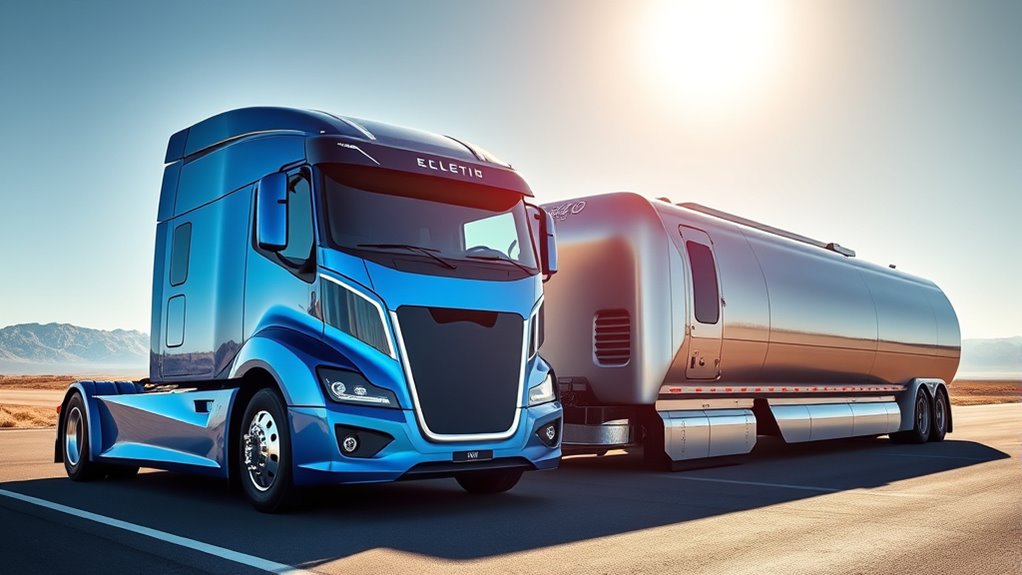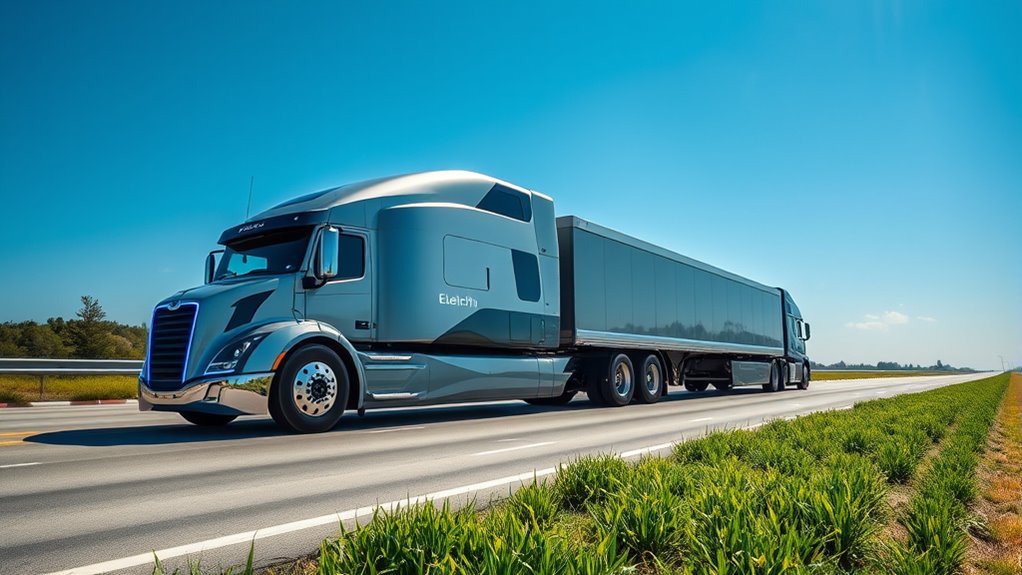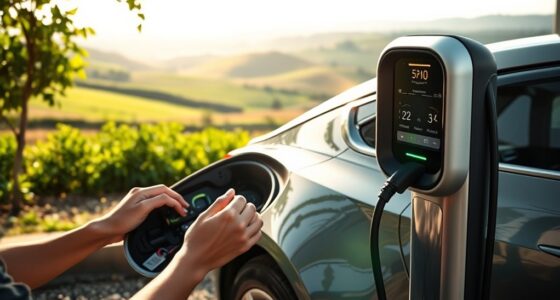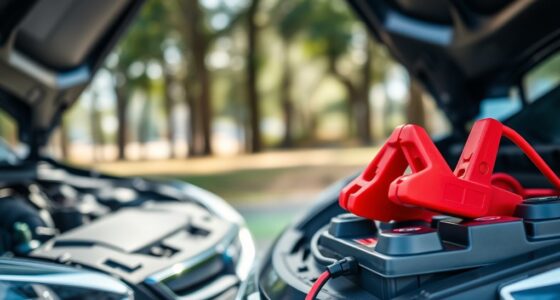Electric trucks currently lead for regional deliveries thanks to a mature charging network and rapidly improving battery tech. However, hydrogen vehicles hold promise for long-haul routes with quick refueling and longer ranges, provided infrastructure expands. Both options are evolving fast, but their future success depends on developments in technology and infrastructure. Stay tuned to discover how these advancements may shape the trucking industry and which option might be the true winner.
Key Takeaways
- Electric trucks excel for regional deliveries due to mature charging infrastructure and shorter recharge times.
- Hydrogen trucks offer rapid refueling and longer ranges, making them suitable for long-haul freight.
- Battery advancements are decreasing costs and increasing range, boosting electric truck viability.
- Hydrogen infrastructure remains limited but, if expanded, could make hydrogen trucks more competitive.
- Both technologies are evolving rapidly; regional needs and infrastructure development influence the future winner.

As the world seeks cleaner energy solutions for transportation, electric and hydrogen vehicles stand out as the leading contenders. When it comes to trucking, both options promise to revolutionize freight movement, but each has unique strengths and challenges. Your decision depends on understanding how battery technology and fueling infrastructure impact their viability. Electric trucks rely heavily on advancements in battery technology, which determine how far they can go on a single charge and how quickly they can recharge. As battery technology improves, you’ll find electric trucks offering longer ranges and shorter charging times, making them increasingly practical for long-haul routes. However, the current limitations of batteries mean you might face longer downtimes compared to refueling traditional diesel trucks. The development of fast-charging stations and high-capacity batteries is *essential* for making electric trucking a seamless experience. On the other hand, hydrogen vehicles depend on a different set of infrastructure: fueling stations that dispense hydrogen fuel. While hydrogen offers the advantage of quick refueling—similar to diesel—you’ll need access to a growing network of hydrogen stations, which are still sparse in most regions. Building this fueling infrastructure requires significant investment and time, but once established, it enables rapid refueling and extended driving ranges. The efficiency of hydrogen fuel cells, coupled with the ability to produce clean hydrogen from renewable sources, makes this option appealing for long-distance freight. You should consider not only current infrastructure but also future developments. Electric trucks benefit from a more mature charging network, especially in regions investing heavily in EV infrastructure, while hydrogen’s success hinges on expanding fueling stations. Both technologies are evolving rapidly, but their success depends on the pace of infrastructure deployment and technological breakthroughs. You might find that electric trucks are more practical for regional deliveries, where charging stations are readily available, whereas hydrogen could excel in long-haul transport, where quick refueling and longer ranges are essential. Ultimately, the choice between electric and hydrogen trucks isn’t just about technology; it’s about infrastructure readiness, operational needs, and future scalability. As advancements in battery technology continue to reduce costs and improve performance, electric trucks become increasingly attractive. Conversely, as hydrogen fueling infrastructure expands, hydrogen-powered trucks could offer a compelling alternative for heavy-duty trucking. Additionally, wall organization solutions can play a role in optimizing space for charging stations or hydrogen fueling setups at logistics hubs. Your goal should be to stay informed about ongoing developments in both fields, as these technologies are poised to reshape the future of trucking in ways that align with your sustainability and efficiency objectives.
Frequently Asked Questions
How Do Charging Times Compare Between Electric and Hydrogen Trucks?
You’ll find that charging times vary markedly between electric and hydrogen trucks. Electric trucks rely on charging infrastructure, which can take anywhere from 30 minutes to several hours, depending on the charger type and battery longevity. Hydrogen trucks, however, refuel in about 10 minutes, offering quicker turnaround times. This difference impacts your operation’s efficiency, with hydrogen’s faster refueling giving it an edge in minimizing downtime and maintaining productivity.
What Are the Safety Concerns for Hydrogen Fuel Cells?
Hydrogen leakages and fire hazards are key safety concerns you face with fuel cells. You must prevent hydrogen leaks, as even small amounts are highly flammable and can cause explosions. Fire hazards are serious, requiring robust safety measures during storage and handling. You need to stay vigilant, use proper safety protocols, and guarantee your system is well-maintained to minimize risks associated with these dangers.
How Sustainable Are the Manufacturing Processes for Each Technology?
You should consider how sustainable each technology’s manufacturing processes are, focusing on battery recycling and manufacturing emissions. Electric trucks typically involve more resource-intensive battery production, but advances in recycling are improving sustainability. Hydrogen trucks, on the other hand, rely on energy-intensive methods for producing hydrogen, which generate significant emissions. Overall, neither is perfect, but ongoing innovations aim to reduce environmental impacts and improve the sustainability of both options.
What Is the Long-Term Cost Difference for Operators?
You’ll find that long-term costs for operators depend heavily on operational expenses and maintenance costs. Electric trucks usually have lower maintenance because they have fewer moving parts and no oil changes, saving you money over time. Hydrogen trucks might have higher operational expenses due to fuel costs and more complex maintenance. So, electric vehicles tend to be more cost-effective in the long run, reducing your overall expenses.
How Will Infrastructure Development Impact Adoption Rates?
You’ll see infrastructure development play a huge role in adoption rates. As charging station proliferation increases and grid capacity expands, it’ll become easier and more convenient for you to choose electric trucks. These improvements reduce downtime and range anxiety, encouraging more operators to switch. Faster, more widespread infrastructure guarantees you won’t worry about finding charging points, making electric trucks a more attractive and practical option for your fleet.
Conclusion
As you weigh the future of trucking, remember that neither electric nor hydrogen is a silver bullet. Think of it like choosing between two roads—each has its bumps and bends. While electric trucks shine with cleaner energy, hydrogen offers longer range and quick refueling. Ultimately, the winner depends on your needs, but embracing innovation is like planting seeds for a greener, more sustainable journey ahead. The road to the future is yours to shape.










